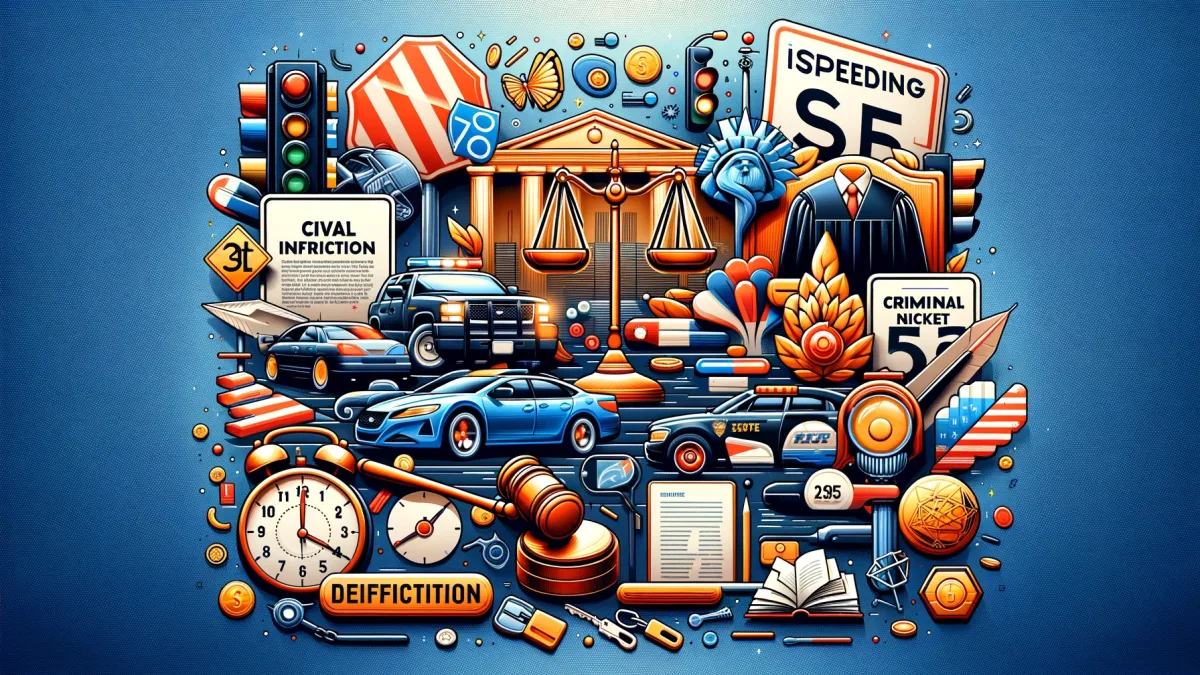Hey there, speedsters and law-abiding citizens alike! Have you ever found yourself with a heavy foot on the gas pedal, only to be greeted by those flashing lights in your rearview mirror? If so, you’re probably familiar with the sinking feeling that accompanies a speeding ticket. But here’s a question that might have crossed your mind as you watched that ticket being written: “Is this going to make me a criminal?” Well, fear not. As your friendly neighborhood legal guide, I’m here to break down the ins and outs of speeding tickets and their status in the eyes of the law.
Speeding Tickets: Civil Infractions or Criminal Offenses?
Let’s cut to the chase. In most cases, a speeding ticket is considered a civil infraction, not a criminal offense. What does this mean for you? Essentially, a civil infraction is a violation of the law that doesn’t rise to the level of criminal conduct. It’s more of a “legal oops” than a “you’re in big trouble” situation. Civil infractions typically result in fines, and sometimes points on your driver’s license, but they don’t carry the stigma or consequences of a criminal record.
But Wait, There’s a Twist
While speeding is usually a civil matter, there are circumstances where it can escalate to a criminal offense. How so? Well, if you’re driving at a speed so reckless that it’s considered dangerous to the public, you might be charged with reckless driving, which is a misdemeanor in many states. Factors that can bump a speeding violation up to reckless driving include the speed at which you were traveling, the presence of other vehicles or pedestrians, road conditions, and whether any property damage or bodily injury occurred.
The Legal Landscape Across the States
It’s important to note that traffic laws vary significantly from one state to another. Some states have stricter laws regarding speeding and may impose harsher penalties, while others are more lenient. For example, in some states, excessive speeding can lead to an automatic reckless driving charge, while in others, it might still be treated as a civil infraction unless other aggravating factors are present.
Consequences of Speeding: Beyond the Ticket
Receiving a speeding ticket can lead to several immediate and long-term consequences, including:
- Fines: The most immediate impact of a speeding ticket is usually a fine. The amount can vary widely depending on how much you were exceeding the speed limit and the state in which you were caught.
- Points on Your License: Many states use a point system to track driving offenses. Accumulating too many points can lead to increased insurance premiums, and potentially, the suspension or revocation of your driver’s license.
- Insurance Rate Increases: Even a single speeding ticket can cause your car insurance rates to go up, as insurers may view you as a higher-risk driver.
- Possible Criminal Charges: As mentioned, under certain conditions, speeding can escalate to a criminal charge, such as reckless driving, which might result in jail time, probation, or community service, in addition to fines and points on your license.
Navigating the Aftermath of a Speeding Ticket
If you find yourself with a speeding ticket, you have a few options. You can pay the fine and accept the consequences, or you can contest the ticket in court, especially if you believe the ticket was unjustified or if you have evidence that could mitigate the charges. Consulting with a traffic law attorney can provide you with guidance tailored to your specific situation and help you understand the best course of action.
Driving Home the Point: Safe and Sound
In the grand scheme of things, the best way to avoid the legal kerfuffle that comes with speeding is, well, not to speed. Keeping within speed limits not only helps you steer clear of fines and legal troubles but also makes the roads safer for everyone.
Remember, while a speeding ticket is usually not a criminal offense, driving responsibly is always the best policy. So, the next time you’re tempted to put the pedal to the metal, consider the legal and safety implications of your need for speed.









Leave a Reply